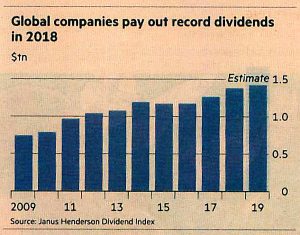Weekly Roundup, 26th February 2019

We begin today’s Weekly Roundup in the FT, with the Chart That Tells A Story. This week it was about dividends.
Contents
Dividends
Kate Beioley reported that global dividends were up 9.3% in 2018, to a new record level of $1.37 trn, despite concerns over global growth (and Brexit worries here in the UK).
- After stripping out exceptional items, growth was 8.5%, well about the long-term trend of 6%.
Growth for 2019 is predicted to be 5.1%, below trend.
US firms issued 42% of global dividends, but their rate of growth was only 7.2%, compared to 8.8% in the UK.
- UK yields are now as high as during the 2008 crisis, as Brexit depresses share prices but dividend yields have been maintained.
With the UK dividend allowance now cut from £5K pa to £2K pa, Hargreaves Lansdown have calculated that just £47K of UK shares in a taxable account will put you over the limit.
VCT demand
Kate’s second article was about a drop in demand for VCTs following a rule change.
- The amount raised is down 23% on the same stage in 2018, the year with the second-highest raise on record.
- £396M had been invested, compared to £518M last year.
Rule changes mean that there are fewer suitable companies to invest in, and Brexit uncertainties around the prospects for small UK firms don’t help either.
Inflows to investment trusts in general are down a whopping 85%, from £48.5 bn to £7.2 bn.
Investment konmari
I would imagine that by now, most of you have heard of konmari, the Japanese approach to tidying up promoted by Marie Kondo.
- In the FT, Moira O’Neill of interactive investors looked at investment konmari.
Amongst her tips were:
- Keep a central list of all investments
- Think about consolidating pensions
- Spark joy by relating investments to life goals
- Minimise your tax
- Focus on what to keep as much as on what to throw away
- Get rid of holdings that are less than 1% of your portfolio
- Consider a core and satellite approach
- Keep your charges low, and
- Use a portfolio X-Ray tool.
Pension freedoms
The FT continued its assault on the 2015 pension freedoms with an article by Josephine Cumbo.
- In contrast to the FT, I’m a big fan of the reforms as they removed the requirement for people like me to buy a poor value annuity.
- And I’m not alone – even the FT concedes that the reforms have been “hugely popular”.
Josephine seems worried that unsophisticated / poor investors have access to the riskier pension products used by the rich, with the help of advisors.
- Unfortunately, that’s the way things are in investment.
- Drawdown offers better returns than annuities because it is riskier (more volatile).
The holy grail of low risk, high return doesn’t exist.
- And annuities are still available for those who believe in them.
Alongside this, there does seem to have been a surge in the number of scams, as liberated pension pots make attractive targets for rogues.
- £200M was lost in 2018, with the average person affected losing £91K.
People’s pension
Josephine’s second article was about the announcement from workplace pensions provider the People’s Pension (PP) that it is cutting its fees.
PP currently charges a flat rate of 0.5% pa, but is switching to a banded structure:
- 0.5% up to £3K
- 0.4% from £3K to £10K
- 0.3% from £10K to £25K
- 0.25% from £25K to £50K, and
- 0.2% on sums above £50K.
By my calculations, it would be cheaper to use PP than NEST for pots above £53K or so.
- This merits further investigation.
I’ve linked to (and written about) more than one article about share buybacks in recent weeks, but now Michael Mackenzie has covered them in the FT.
- Firms buying shares are often generating a lot of cash, which attracts activist investors who push for buybacks.
This excess cash needs to be handed back to investors somehow, and buybacks are more flexible than a progressive dividend policy.
Some observers link buybacks to rising share prices, which suits executives with lots of options.
- In theory, the cash returned is exactly offset by the number of cancelled shares, but the EPS will rise, and this can push up the share price.
At the same time, the kind of companies doing buybacks are likely to outperform in any case.
Michael identifies the real problem as the funding of buybacks through the issue of bonds.
- This was originally because a lot of cash was held overseas, and would have been taxed upon repatriation.
Trump’s tax reforms reduced this impact, and so the numbers for 2018 don’t look so bad.
If the US politicians succeed in restricting buybacks, Michael foresees a lot of corporate vanity projects and a tech M&A boom that might lead to reduced competition.
- He also predicts that jobs will move offshore.
Private equity
In the Economist, Buttonwood looked at an AQR report on private equity.
After fees, private equity outperformed the S&P500 by an average of 2.3% a year between 1986 and 2017
This sounds good, but buyout targets will tend to be small, cheap firms, and a small-cap value index tracker would have beaten private equity (PE).
- Buttonwood also notes that the PE edge has disappeared since the 2008 financial crisis.
- During this period, the gap in valuations between buyouts and S&P500 companies has closed.
Buttonwood speculates that the continuing attractions of PS to pension funds is that they can’t borrow, whereas PE uses between $1 and $2 of debt for each $1 of equity.
- And the infrequent re-valuations (“mark to market”) process for PE makes the returns from it seem artificially smooth.
Which means that a portfolio that is part stocks and part PE will look less volatile, outside of a prolonged bear market.
- This can prevent “de-risking” of portfolios (stock sales) at market bottoms, but the effect is countered by the tendency of PE to capital raise (and then deploy) at market peaks.
Quick links
I have twelve for you this week:
- The Adventurous Investor wondered whether ETFs could be used in a revolutionary way.
- Financial Planning Today reported that 8 in 10 people want DB schemes to offer partial transfers.
- The FT looked at Peppa Pig’s attempt to conquer the world.
- And at the veganism boom in company profits.
- And at how UK car makers were forced into the slow lane.
- Musing on Markets had part 9 of the annual data update – The Pricing Game.
- Alpha Architect looked at a decade of under-performance from trend following.
- And at which trend following strategy would you choose if you had to.
- And at the relative performance of hedge funds from listed and unlisted companies.
- Flirting with Models looked at the same trend following glitch as Alpha Architect,
- The UK Value Investor wondered whether HSBC might be worth an investment.
- Pensions Expert reported that alternative risk premium funds have failed to deliver.
Until next time.





















